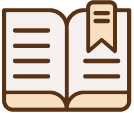1.4 Reflection, Reflective Practice & Critical Reflection
Reflection is all about pausing to think more deeply. It can help us consider our experiences, beliefs, or assumptions from different angles. Reflection becomes critical when we start to consider the role of power. It’s not just about looking inward, but also looking outward and asking: How does power show up here? Who is centered? Who is left out?
Reflective practice means taking the time to think about your actions, beliefs, and values, and how these shape the way you move through the world. It’s about building self-awareness and intentionally seeking growth as a person and professional. A key part of building self-awareness is recognizing our own biases.
To think critically about your position in professional settings, it’s important to explore implicit bias. Implicit biases are attitudes or stereotypes we hold about specific social groups, often without realizing it. These biases can be both positive or negative, and they’re often shaped by dominant cultural narratives, the media, and our own personal experience.
Because implicit biases tend to operate unconsciously, or below the surface, we might not realize how they’re influencing our thoughts and actions. This means that we may unintentionally endorse negative attitudes towards some social groups. As such, implicit biases can affect how we make decisions, interact with others, and interpret information.
In professional contexts, implicit bias can show up in many ways. For example:
- In healthcare, it may influence how pain is assessed and treated in patients from different racial or cultural backgrounds.
- In education, it can shape what opportunities students are afforded based on assumptions about their ability or behaviour.
- In librarianship, it might affect which authors or sources are considered credible or included in collections, often privileging Western, white, or male voices.
- In law, bias can impact how clients are represented or how sentencing decisions are made, particularly for equity-deserving communities.
- In research, it can influence which topics are studied, which populations are included, and how findings are interpreted, often reinforcing existing inequalities.
Even though we can’t fully eliminate our implicit biases, we can become more aware of them and work to reduce their impact. One way to begin is by identifying the biases we may hold.
To reflect on this, consider taking one or more of the Implicit Association Tests offered by Harvard’s Project Implicit. There are 13 short quizzes to choose from, including race, gender, sexuality, disability, etc.
All activities can also be found in a downloadable workbook. Visit the ‘Using this Resource‘ page to access the workbook in MS Word and PDF formats.
A note as you complete this activity: You might be surprised, or even uncomfortable, by some of the results. That’s completely normal. We all hold biases, and uncovering them is an important first step in addressing them. Building self-awareness is part of the ongoing work of learning and unlearning.
As we’ve seen, critical reflection builds on regular reflection, but it goes a step further. It involves asking deeper questions about why we think the way we do, and how our assumptions might be shaped by broader social systems and power structures.
This kind of reflection can be challenging. It takes time, honesty, and practice. As we become more comfortable questioning our assumptions, we start to see the hidden norms and structures that uphold the status quo, and how we can work to change them.
The assumptions, attitudes, and beliefs that operate outside of conscious awareness.


